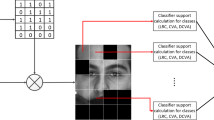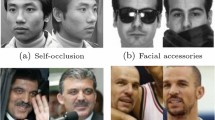Abstract
In this paper, we propose a novel occlusion invariant face recognition algorithm based on Selective Local Nonnegative Matrix Factorization (S-LNMF) technique. The proposed algorithm is composed of two phases; the occlusion detection phase and the selective LNMF-based recognition phase. We use local approach to effectively detect partial occlusion in the input face image. A face image is first divided into a finite number of disjointed local patches, and then each patch is represented by PCA (Principal Component Analysis), obtained by corresponding occlusion-free patches of training images. And 1-NN threshold classifier was used for occlusion detection for each patch in the corresponding PCA space. In the recognition phase, by employing the LNMF-based face representation, we exclusively use the LNMF bases of occlusion-free image patches for face recognition. Euclidean nearest neighbor rule is applied for the matching. Experimental results demonstrate that the proposed local patch-based occlusion detection technique and S-LNMF-based recognition algorithm works well and the performance is superior to other conventional approaches.
Preview
Unable to display preview. Download preview PDF.
Similar content being viewed by others
References
Leonardis, A., Bischof, H.: Dealing with occlusions in the eigenspace approach. In: Proc. IEEE Conf. Computer Vision and Pattern Recognition, pp. 453–458 (1996)
Leonardis, A., Bischof, H.: Robust recognition using eigenimages. Computer Vision and Image Understanding 78, 99–118 (2000)
Li, S.Z., Hou, X.W., Zhang, H.J., Cheng, Q.S.: Learning spatially localized, part-based representation. In: Proc. IEEE Conf. Computer Vision and Pattern Recognition, pp. 207–212 (2001)
Lee, D.D., Seung, H.S.: Learning the parts of objects by non-negative matrix factorization. Nature 401, 788–791 (1999)
Martinez, A.M.: Recognizing imprecisely localized, partially occluded, and expression variant faces from a single sample per class. IEEE Trans. Pattern Analysis and Machine Intelligence 24(6), 748–763 (2002)
Marttinez, A.M., Benavente, R.: "The AR Face Database," CVC Technical Report, no. 24 (June 1998)
Tax, D.: One-Class Classification, PhD thesis, Delft University of Technology (2001)
De Ritter, D., Tax, D., Duin, R.P.W.: An experimental comparison of one-class classification methods. In: Proc. Fourth Annual Conference of the Advanced School for Computing and Imaging, June 1998, ASCI, Delft (1998)
Duda, R.O., Hart, P.E., Stork, D.G.: Pattern Classification. John Wiley & Sons, Chichester (2001)
Turk, M., Pentland, A.: Face Recognition Using Eigenfaces. In: Proc. IEEE Conf. Computer Vision and Pattern Recognition, pp. 586–591 (1991)
Jain, A.: Fundamentals of Digital Image Processing. Prentice-Hall, Englewood Cliffs (1982)
Trucco, E., Verri, A.: Introductory Techniques for 3-D Computer Vision. Prentice-Hall Inc., Englewood Cliffs (1998)
Shapiro, L.G., Stockman, G.C.: Computer Vision. Prentice-Hall Inc., Englewood Cliffs (2001)
Sirovich, L., Kirby, M.: Low-Dimensional Procedure for the Characterization of Human faces. J. Optical soc. Am. A 4, 519–524 (1987)
Kirby, M., Sirovich, L.: Application of Karhunen-Love Procedure for the Characterization of Human Faces. IEEE Trans. Pattern Analysis and Machine Intelligence 12(1), 103–108 (1990)
Turk, M., Pentland, A.: Eigenfaces for recognition. Journal of Cognitive Neuroscience 3, 71–86 (1991)
Moghaddam, B., Pentland, A.: Probabilistic Visual Learning for Object Recognition. IEEE Trans. Pattern Analysis and Machine Intelligence 19(7), 696–710 (1997)
Author information
Authors and Affiliations
Editor information
Editors and Affiliations
Rights and permissions
Copyright information
© 2006 Springer-Verlag Berlin Heidelberg
About this paper
Cite this paper
Oh, H.J., Lee, K.M., Lee, S.U., Yim, CH. (2006). Occlusion Invariant Face Recognition Using Selective LNMF Basis Images. In: Narayanan, P.J., Nayar, S.K., Shum, HY. (eds) Computer Vision – ACCV 2006. ACCV 2006. Lecture Notes in Computer Science, vol 3851. Springer, Berlin, Heidelberg. https://doi.org/10.1007/11612032_13
Download citation
DOI: https://doi.org/10.1007/11612032_13
Publisher Name: Springer, Berlin, Heidelberg
Print ISBN: 978-3-540-31219-2
Online ISBN: 978-3-540-32433-1
eBook Packages: Computer ScienceComputer Science (R0)




